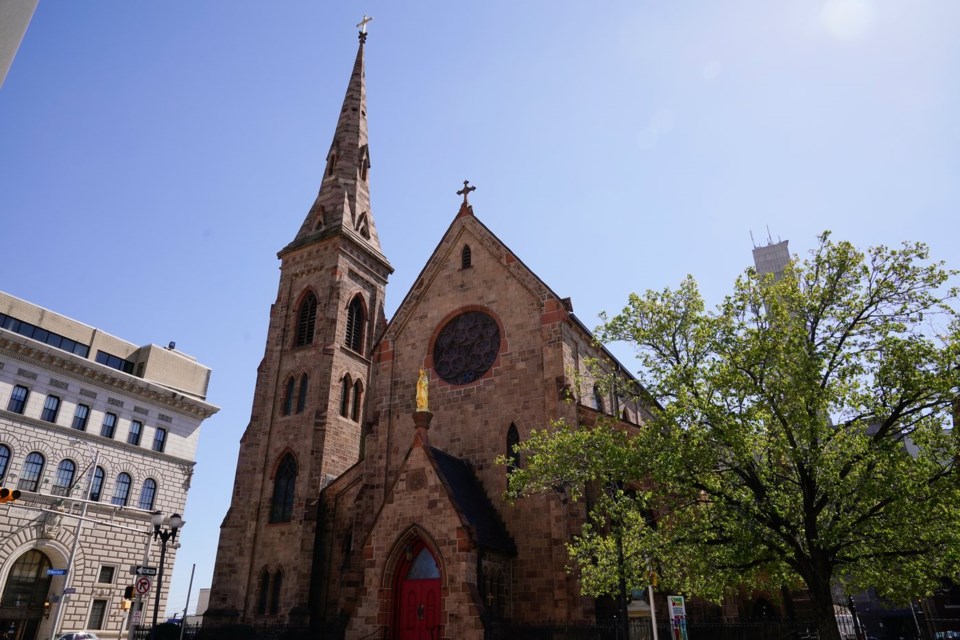TRENTON, N.J. (AP) — New Jersey can have a grand jury examine allegations of clergy sexually abusing children, the state's Supreme Court ruled Monday, after a Catholic diocese that had tried for years to block such proceedings recently reversed course.
The Diocese of Camden previously had argued that a court rule prevents the state attorney general from impaneling a grand jury to issue findings in the state’s investigation into decades of allegations against church officials. But the diocese notified the court in early May that it would no longer oppose that. Camden Bishop Joseph Williams, who took over the diocese in March, said he'd met with stakeholders in the diocese and there was unanimous consent to end the church’s opposition to the grand jury.
The seven-member Supreme Court concluded such a grand jury inquiry is allowed.
“Courts cannot presume the outcome of an investigation in advance or the contents of a presentment that has not yet been written," the court wrote in an opinion joined by all seven justices. “We find that the State has the right to proceed with its investigation and present evidence before a special grand jury.”
The state attorney general's office praised the decision in an emailed statement and said it's committed to supporting survivors of sexual abuse.
“We are grateful for the New Jersey Supreme Court’s decision this morning confirming what we have maintained throughout this lengthy court battle: that there was no basis to stop the State from pursuing a grand jury presentment on statewide sexual abuse by clergy,” First Assistant Attorney General Lyndsay V. Ruotolo said in an emailed statement.
The Camden Diocese is still committed to cooperating with the effort, it said in a statement.
“To the victims and all those impacted by abuse, we reaffirm our sorrow, our support, and our unwavering resolve to do what is right, now and always,” the diocese said.
An email seeking comment was sent Monday to the Catholic League, an adcvocacy and civil rights organization that still opposed the grand jury after the diocese’s change.
Where New Jersey's investigation began
A Pennsylvania grand jury report in 2018 found more than 1,000 children had been abused in that state since the 1940s, prompting the New Jersey attorney general to announce a similar investigation. The results of New Jersey’s inquiry never became public partly because the legal battle with the Camden diocese was unfolding amid sealed proceedings.
Then this year, the Bergen Record obtained documents disclosing that the diocese had tried to preempt a grand jury and a lower court agreed with the diocese.
The core disagreement was whether a court rule permits grand juries in New Jersey to issue findings in cases involving private individuals. Trial and appellate courts found that isn’t allowed.
Hearing arguments on April 28, members of the high court repeatedly questioned whether challenging the state was premature, since lower court proceedings prevented New Jersey from seating a grand jury that would investigate any allegations or issue findings, called a presentment.
Lloyd Levenson, the church’s attorney, answered that “you’d have to be Rip Van Winkle” not to know what the grand jury would say.
“The goal here is obviously to condemn the Catholic Church and priests and bishops,” he said.
The court said Monday it wasn't ruling on any underlying issues and a trial court judge would still have the chance to review the grand jury's findings before they became public.
Mark Crawford, state director of the Survivors Network for those Abused by Priests, said Monday in a text message he's “elated” by the court's decision.
"Decades of crimes against children will finally be exposed," he said.
How the diocese won early rulings
In 2023, a trial court judge sided with the diocese, finding that a grand jury would lack authority because it would be focused on “private conduct,” rather than a government agency’s actions. An appeals court affirmed that judgment last year, and the attorney general's office appealed to the state Supreme Court.
Documents the high court unsealed in March sketched out some of what the state’s task force has found so far, without specific allegations. They show 550 phone calls alleging abuse from the 1940s to the “recent past” came into a state-established hotline.
The diocese argued a grand jury isn’t needed, largely because of a 2002 memorandum of understanding between New Jersey Catholic dioceses and prosecutors. requiring church officials to report abuse.
But the Pennsylvania report led to reexamining the statute of limitations in New Jersey, where the time limits on childhood sex abuse claims were overhauled in 2019. The new law allows child victims to sue until they turn 55 or within seven years of their first realization that the abuse caused them harm. The previous statute of limitations was age 20, or two years after realizing abuse caused harm.
Also in 2019, New Jersey’s five Catholic dioceses listed more than 180 priests who have been credibly accused of sexually abusing minors over several decades. Many listed were deceased and others removed from ministry.
The church has settled with accusers
The Camden diocese, like others nationwide, filed for bankruptcy amid a torrent of lawsuits — up to 55, according to court records — after the statute of limitations was relaxed.
In 2022, the diocese agreed to pay $87.5 million to settle allegations involving clergy sex abuse against some 300 accusers, one of the largest cash settlements involving the Catholic church in the U.S.
The agreement, covering six southern New Jersey counties outside Philadelphia, exceeded the nearly $85 million settlement in 2003 in the clergy abuse scandal in Boston, but was less than settlements in California and Oregon.
Mike Catalini, The Associated Press


